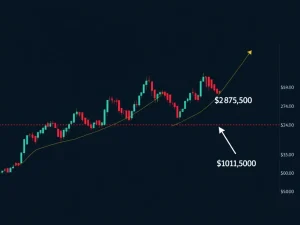JPMorgan’s Explosive Standoff: Gemini Re-Onboarding Halted Amid Anti-Competitive Allegations

The financial world is abuzz with the latest development in the ongoing saga between traditional finance and the burgeoning crypto industry. In a move that has sent ripples across the digital asset landscape, financial giant JPMorgan Chase has suspended the re-onboarding process for crypto exchange Gemini. This decision comes hot on the heels of pointed public criticism from Gemini co-founder Tyler Winklevoss, who has accused the banking behemoth of engaging in anti-competitive practices. This isn’t just a dispute between two entities; it’s a pivotal moment highlighting the deep-seated tensions over data access, regulatory power, and the future of finance.
The Core Conflict: JPMorgan vs. Winklevoss & Gemini
At the heart of this controversy lies a fundamental disagreement over how financial data should be accessed and shared. Tyler Winklevoss, a vocal advocate for the decentralized future, publicly criticized JPMorgan‘s efforts to undermine the Consumer Financial Protection Bureau’s (CFPB) Open Banking Rule. This rule is designed to empower consumers, allowing them to freely share their banking data with third-party fintech services. Winklevoss claims that JPMorgan’s decision to halt Gemini‘s re-onboarding is direct retaliation for his outspoken opposition to the bank’s proposed data access fees and policies.
Winklevoss articulated his concerns, stating, “They want us to stay silent while they quietly try to take away your right to access your banking data for free.” He views JPMorgan’s actions as a broader strategy to stifle innovation, particularly in the crypto and fintech sectors. The proposed fees, he argues, would disproportionately burden startups and platforms like Plaid, which are crucial for connecting traditional bank accounts with digital asset services. This, in turn, would limit consumer access to the rapidly expanding world of digital assets.
The Fight for Open Banking: A Crucial Battle for Crypto
The concept of open banking is a cornerstone of modern financial innovation. It’s about giving consumers control over their financial data, enabling them to share it securely with third-party applications and services. This fosters competition, drives innovation, and allows for more personalized and efficient financial products. For the crypto industry, open banking is vital. Many crypto exchanges and decentralized finance (DeFi) platforms rely on seamless connections to traditional bank accounts for onboarding users, facilitating deposits, and enabling withdrawals. Without it, the friction for users increases significantly, hindering adoption and growth.
The CFPB’s Open Banking Rule aims to formalize and protect this right to data portability. JPMorgan’s alleged attempts to overturn or dilute this rule are seen by critics as a move to re-establish centralized control over financial data, potentially creating a bottleneck for fintech and crypto innovation. This is not an isolated incident; similar concerns have been raised about other major banks, including Deutsche Bank, which has faced accusations of pressuring partners to disengage from crypto ventures. The current standoff between JPMorgan and Gemini is a high-profile example of this larger battle for the future of financial data.
Why is Open Banking so important for Crypto?
- Seamless On-Ramps/Off-Ramps: Allows users to easily fund crypto accounts from their bank accounts and convert crypto back to fiat.
- Enhanced User Experience: Reduces friction and complexity for new users entering the crypto space.
- Innovation: Enables fintechs and crypto projects to build new services on top of existing financial infrastructure.
- Competition: Prevents large, incumbent banks from monopolizing financial services and data.
- Financial Inclusion: Potentially lowers barriers for underserved populations to access digital financial services.
Beyond Anti-Competitive Allegations: JPMorgan’s Stance
While JPMorgan has not directly addressed Tyler Winklevoss’s specific allegations of retaliatory behavior or anti-competitive practices, the bank has consistently emphasized its focus on compliance and risk mitigation. For traditional financial institutions, the crypto sector often presents unique challenges related to anti-money laundering (AML) and know-your-customer (KYC) regulations. Banks are under immense scrutiny to ensure they are not inadvertently facilitating illicit financial activities.
The bank’s stated position often revolves around the need for robust regulatory frameworks before fully embracing digital assets. However, this cautious approach often clashes with the fast-paced, innovation-driven nature of the crypto world. The pause in Gemini‘s re-onboarding also appears to contradict JPMorgan’s broader acknowledgment of growing institutional interest in digital assets, including its own ventures into blockchain technology and digital currencies like JPM Coin. This duality creates a complex narrative: a bank exploring digital assets internally while seemingly restricting access for external crypto platforms.
Ripple Effects: What This Means for the Broader Crypto Market
The controversy surrounding JPMorgan and Gemini carries significant implications for the entire crypto ecosystem. Critics argue that such centralized gatekeeping, exemplified by JPMorgan’s alleged tactics, directly threatens the decentralization principles that underpin blockchain technology. If large banks can unilaterally restrict access to essential financial infrastructure, it creates a choke point that could stifle innovation and limit consumer choice.
For crypto advocates, the consequences extend far beyond Gemini. Restrictive fees for data access or the arbitrary withdrawal of banking services could:
- Hinder Startup Growth: Smaller crypto and fintech startups, already operating on tighter margins, would find it even harder to compete.
- Limit Consumer Access: Increased friction in moving funds between traditional banks and crypto platforms could deter new users.
- Fragment the Financial Landscape: It could lead to a two-tiered system where only the largest, most compliant crypto entities can secure traditional banking support.
- Impact Regulatory Debates: This incident will undoubtedly fuel discussions among regulators about the need for clearer guidelines on de-banking and anti-competitive practices in the digital asset space.
The outcome of this particular standoff, and similar ones, will likely influence global regulatory approaches to integrating digital assets into traditional financial systems. A shift towards stricter oversight of de-banking tactics could foster a more equitable landscape for crypto projects. Conversely, inaction risks entrenching the dominance of traditional institutions and potentially slowing down the broader adoption of digital assets.
Navigating the Regulatory Labyrinth
The current situation highlights the delicate balance that regulators must strike between fostering innovation, ensuring financial stability, and protecting consumers. The allegations of anti-competitive behavior against JPMorgan underscore the need for clear guidelines on how traditional financial institutions interact with the rapidly evolving crypto sector. As digital assets become more mainstream, the lines between traditional finance and decentralized finance will continue to blur, making these regulatory battles even more critical.
The future may see increased regulatory intervention to prevent large financial players from leveraging their market position to suppress competition. This could manifest in stronger enforcement of open banking principles, or even new legislation specifically designed to prevent de-banking without justifiable cause. For now, JPMorgan’s actions serve as a potent reminder of the complex interplay between compliance, competition, and technological evolution in the financial world.
The dispute between JPMorgan and Gemini, spearheaded by Tyler Winklevoss‘s vocal criticism, is more than just a business disagreement. It’s a high-stakes battle over the principles of open banking, the future of data access, and the very foundation upon which the crypto industry seeks to integrate with the traditional financial system. As regulators deliberate and the industry watches closely, the outcome of this and similar confrontations will significantly shape the accessibility, innovation, and competitive landscape of finance for years to come. It’s a compelling narrative of innovation versus incumbency, and the ripples are just beginning to spread.
Frequently Asked Questions (FAQs)
Q1: Why did JPMorgan suspend Gemini’s re-onboarding?
A1: JPMorgan suspended Gemini’s re-onboarding process following public accusations from Gemini co-founder Tyler Winklevoss, who claimed the bank was engaging in anti-competitive practices. Winklevoss linked the suspension to his vocal opposition to JPMorgan’s proposed data access fees and efforts to undermine the CFPB’s Open Banking Rule.
Q2: What are Tyler Winklevoss’s main allegations against JPMorgan?
A2: Tyler Winklevoss alleges that JPMorgan’s decision is retaliatory, stemming from his criticism of the bank’s attempts to overturn the Consumer Financial Protection Bureau’s (CFPB) Open Banking Rule. He claims JPMorgan wants to charge fees for data access, which he believes would stifle innovation and consumer rights, particularly for fintech and crypto services.
Q3: What is the Open Banking Rule and why is it important for crypto?
A3: The Open Banking Rule (promoted by the CFPB) allows consumers to freely share their banking data with third-party fintech services. For crypto, it’s crucial as it enables seamless connections between traditional bank accounts and crypto exchanges, facilitating deposits, withdrawals, and overall user access to digital assets.
Q4: How has JPMorgan responded to the allegations?
A4: JPMorgan has not directly addressed Winklevoss’s specific allegations. Instead, the bank has reiterated its focus on compliance and risk mitigation, often citing the need for robust frameworks to combat money laundering when dealing with crypto clients.
Q5: What are the broader implications of this dispute for the crypto industry?
A5: This dispute highlights intensifying tensions between traditional finance and the crypto ecosystem. Critics fear that centralized gatekeeping by banks could hinder innovation, limit consumer access to digital assets, and create a fragmented financial environment where crypto startups struggle to secure traditional financial support. It also raises questions about future regulatory oversight of de-banking tactics.
Q6: Are other banks facing similar scrutiny regarding crypto ventures?
A6: Yes, the article mentions that the situation mirrors similar scrutiny faced by other banks, including Deutsche Bank, which has also been accused of pressuring partners to disengage from crypto ventures, indicating a broader trend in the traditional finance sector.






